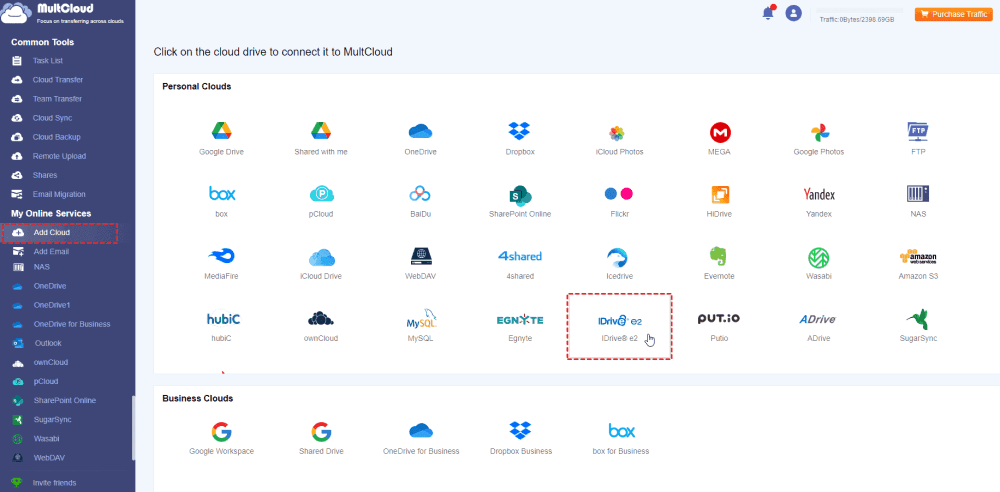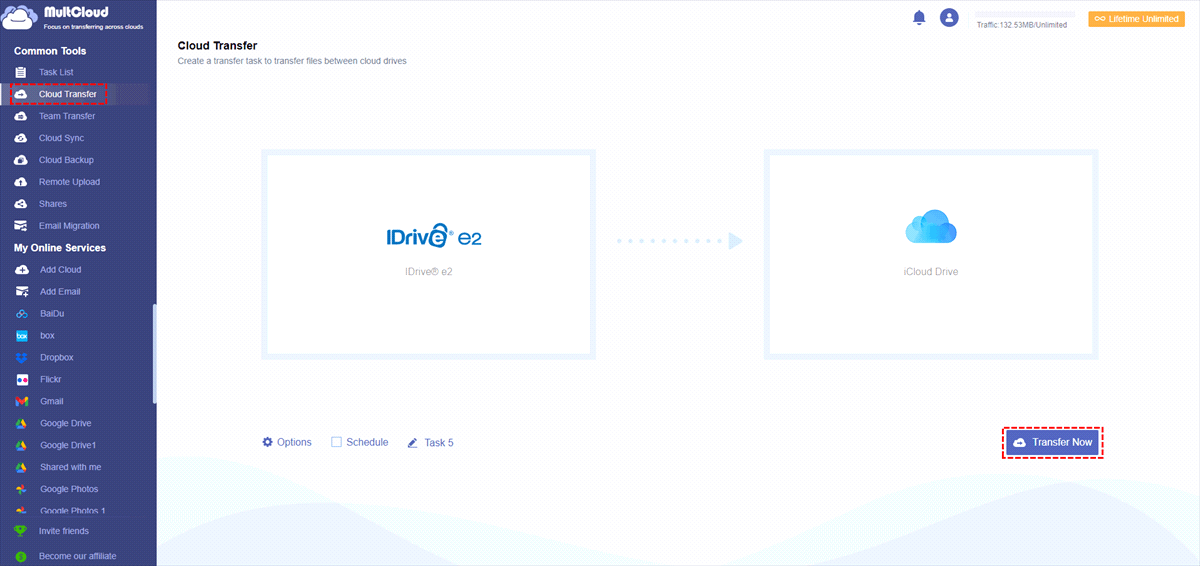Quick Search:
Why Do You Need Cloud Storage?
The digital world is full of potential pitfalls for your data. Here's why cloud storage is a valuable asset:
- Peace of mind: Knowing your data is securely backed up in the cloud eliminates the worry of losing it due to hardware failure or accidental deletion.
- Remote access: Access your important documents, photos, and other files from anywhere, enhancing your productivity and flexibility.
- File sharing made easy: Cloud storage simplifies collaboration by allowing you to share files and folders with others seamlessly.
- Device independence: No longer are you restricted to accessing your data on a specific device. With cloud storage, your files are always within reach.
Now that we understand the benefits of cloud storage, let's explore the strengths and weaknesses of iDrive and iCloud to see which one reigns supreme.
iDrive: Comprehensive Backup Solution
iDrive offers a robust cloud storage solution designed primarily for backups.
- Automatic Backups: Schedule automatic backups to ensure your files are continuously saved without manual intervention. >> Learn other top 3 cloud data backup services.
- Continuous Backup: Never miss a beat with continuous backup, which constantly monitors your files and uploads any changes in real-time.
- File Versioning: Restore previous versions of your files in case of accidental edits or deletions.
- Secure Encryption: Rest assured your data is protected with military-grade 256-bit AES encryption, even at rest on iDrive's servers.
- Cross-Platform Compatibility: iDrive works seamlessly across Windows, macOS, Android, and iOS devices, offering unmatched flexibility.
- Pricing: iDrive provides a range of storage-capable options at affordable costs. There is a plan to suit your demands, regardless of how much space you require—a few megabytes or a ton.
iCloud: Apple's Integrated Cloud Service
iCloud is Apple's cloud storage service seamlessly integrated with its ecosystem.
- Seamless Integration with Apple Devices: iCloud automatically backs up your photos, videos, contacts, and device settings across all your Apple devices, making it incredibly convenient for Apple users.
- Free Storage Tier: iCloud offers a free 5GB storage tier, allowing you to try out the service before committing.
- iCloud Photos: Easily store and access your entire photo library across all your devices with iCloud Photos. Even, you can share photos on iCloud with family and friends.
- Limited File Types: While iCloud excels at backing up Apple-specific data, it's less flexible when it comes to other file types.
- Device Restrictions: iCloud is primarily designed for Apple devices, with limited functionality on non-Apple platforms.
- Pricing: When compared to other cloud storage options, iCloud's premium plans with higher storage capabilities can grow pricey fast.
iDrive vs iCloud: Head-to-Head Comparison
After going over the features of iDrive and iCloud, let's compare them in a few important areas to assist you in making a choice.
1. Compatibility
iDrive: Wins with cross-platform compatibility for Windows, Mac, Android, and iOS devices.
iCloud: Primarily functions seamlessly with Apple devices, with limited functionality on Windows and Android.
2. Storage Options
iDrive: Offers a variety of plans, including unlimited storage options for users with massive data needs.
iCloud: Offers limited storage options, with a maximum of 12TB.
3. iDrive Backup vs iCloud
iDrive: Offers extensive backup capabilities, such as scheduled backups for particular folders, file versioning, and continuous backups.
iCloud: Provides automated device backups, but does not grant fine-grained management over certain folders or file kinds.
4. iDrive vs iCloud: Security
Both: Both iDrive and iCloud utilize military-grade encryption to safeguard your data.
5. iDrive vs iCloud: Pricing
iDrive: Offers a free plan with limited storage and various paid plans with different storage tiers.
iCloud: Provides 5GB of free storage with paid plans for additional storage. Generally, iCloud plans are more expensive than comparable storage options from iDrive.
| iDrive | • Basic (10 GB): Free • Personal (5 TB ~ 100TB for 1 user): $9.95/month ~ $99.95/month • Team (5 TB ~ 40 TB for 5 users ~ 40 users): $9.95/month ~ $79.95/month • Business (1.25 TB ~ 50 TB for unlimited users): $49.95/month ~ $1159.95/month |
| iCloud | • iCloud (5 GB): Free • iCloud+ (50GB): $0.99/month • iCloud+ (200GB): $2.99/month • iCloud+ (2TB): $9.99/month • iCloud+ (6TB): $29.99/month • iCloud+ (12TB): $59.99/month |
6. Ease of Use
iCloud: Wins for a more user-friendly interface, especially for Apple users already familiar with the ecosystem.
iDrive: Might have a slightly steeper learning curve for users unfamiliar with the interface.
Making the Right Choice: iDrive vs iCloud
Choosing between iDrive and iCloud boils down to your priorities and how you plan to use cloud storage.
Who should choose iDrive?
- Users with a mix of devices (Windows, Mac, Android, iOS).
- Users requiring extensive storage space (unlimited storage plans available).
- Users prioritizing robust backup features with file versioning and granular control.
- Users on a budget seeking the most storage for their money.
Who should choose iCloud?
- Users who primarily use Apple devices and value seamless integration within the Apple ecosystem.
- Users with minimal storage requirements (5GB or 12TB might be enough).
- Users who prioritize a simple and user-friendly interface.
Conclusion
iDrive and iCloud provide beneficial cloud storage options, meeting various user requirements. iDrive's extensive feature set and cross-platform compatibility make it an excellent choice for thorough backups. For Apple customers, iCloud excels by providing a smooth and integrated experience with their products and services. In the end, the optimal option is determined by your unique needs and priorities. To find the cloud storage champion that best fits your needs, take into account your budget, desired features, preferred platform, and data storage requirements.
Bonus Tip: Best Way to Transfer iDrive e2 to iCloud or Vice Versa
iDrive e2, favored by many users because of its affordability, is a data backup service provided by iDrive that is similar to Amazon S3. Are you worried about how to transfer data between iDrive e2 and iCloud? Just relying on traditional uploading and downloading methods will not work. It would be best to have a professional cloud file migration tool---MultCloud. Unlike traditional methods, this tool allows you to add multiple cloud accounts and transfer, sync or backup data in the same interface.
- 🔥Simple: Just a few clicks, no manual uploading or downloading required.
- 🔥Automatic: You can set a specific time to let the system run the task automatically.
- 🔥Fast: Up to 10 transfer threads can be enabled simultaneously.
- 🔥Customization: You can set transfer preferences according to your needs.
Next, let's start transferring data between iDrive e2 and iCloud.
Step 1. Go to the MultCloud homepage and follow the prompts to register an account.
Step 2. Log in to the account you just registered, click the "Add Cloud" button, then find iDrive e2 and add it according to the prompts. When adding iDrive e2, you need to enter information such as Access Key, which you need to obtain from iDrive e2 in advance.
Step 3. According to your needs, you can add your iCloud Drive or iCloud Photos account. Adding is similar to above.
Step 4. Click the "Cloud Transfer" button and select the source and destination respectively as needed. If you need scheduled transmission, you can set it in "Schedule". Finally, start the task.
MultCloud Supports Clouds
-
Google Drive
-
Google Workspace
-
OneDrive
-
OneDrive for Business
-
SharePoint
-
Dropbox
-
Dropbox Business
-
MEGA
-
Google Photos
-
iCloud Photos
-
FTP
-
box
-
box for Business
-
pCloud
-
Baidu
-
Flickr
-
HiDrive
-
Yandex
-
NAS
-
WebDAV
-
MediaFire
-
iCloud Drive
-
WEB.DE
-
Evernote
-
Amazon S3
-
Wasabi
-
ownCloud
-
MySQL
-
Egnyte
-
Putio
-
ADrive
-
SugarSync
-
Backblaze
-
CloudMe
-
MyDrive
-
Cubby



